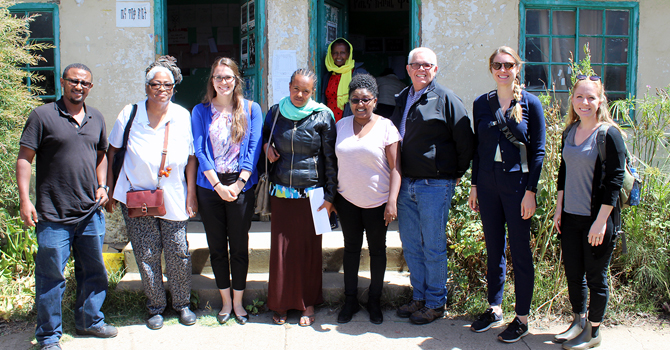School of Public Health Delegation Visits Partners in Ethiopia and Kenya

Public health issues do not simply disappear as economies grow. In fact, development often creates new and unexpected health problems. In low- and middle-income countries around the world, public health institutions tackle emergent problems through their research, training, and advocacy working in partnership with international institutions.
This summer, the School of Public Health's Office of Global Public Health (OGPH) visited collaborators in Ethiopia and Kenya to learn more about their public health challenges and to discuss new avenues for future partnership.
Environmental Health and Epidemiology in Ethiopia
Industrialization is moving Ethiopia toward a market economy, but regulatory policies and infrastructure have not kept up with the pace of job and wealth creation. At Saint Paul's Hospital Millennium Medical College (SPHMMC), where Michigan Public Health has a long history of collaboration, faculty members met to discuss their research investigating links between new pollutants and population health.
The OGPH delegation—led by Dr. Matthew Boulton, Professor of Epidemiology and Senior Associate Dean for Global Public Health—was hosted by Dr. Eyoel Birhan, a lecturer in SPHMMC's Department of Public Health, and Dr. Samrawit Solomon, Director of the Department of Public Health, who facilitated discussions with both faculty and leadership at SPHMMC regarding potential collaborations with the Department of Environmental Health Sciences at Michigan Public Health.
The delegation visited project sites in rural towns north of Addis Ababa to see how research is translated into community-level interventions.
The delegation's discussion with their hosts focused on establishing a prospective cohort so that health outcomes of families throughout Ethiopia could be studied over time. The delegation visited project sites in Debre Birhan and Worabe, two small, rural towns north of Addis Ababa, to see how research is translated into community-level interventions.
"When we think about proposing a joint research project with Sain Paul's, it helps tremendously to see how it might directly play out in the village, because anything you propose has to be done in a culturally competent manner while also being acceptable to the villagers. The only way you're going to get a feel for that is going to the village yourself," says Boulton.
The School of Public Health also works closely with the Ethiopian Public Health Institute (EPHI), and the delegation met with EPHI's new deputy director, Dr. Tsigereda Kifle, to discuss potential research that could be carried out jointly with researchers at Michigan Public Health.
New and Old Partnerships in Kenya
The delegation then traveled to Nairobi, Kenya, to meet with representatives from the Kenya Medical Research Institute (KEMRI) and the African Population Health Research Center (APHRC).
A long-time partner of the School of Public Health, KEMRI has recently undergone a change in leadership, and the Office of Global Public Health took this opportunity to meet Dr. Yeri Kombe, KEMRI's new director, to explore future potential for the partnership.
APHRC was established in 1995 with the goal of fostering research projects conducted in Africa and has been run solely by Africans. After years of demonstrating the success of that model, APHRC is now reaching out and seeking collaborations with international partners like the University of Michigan. The APHRC conducts research in all areas of public health, from malaria and chronic disease to injury and social inequalities in health. The OGPH delegation met with Dr. Joseph Gichuru Wang'ombe, APHRC's deputy executive director, and other colleagues, and Boulton gave a presentation introducing the School of Public Health and the school's research on global vaccination.
"The Office of Global Public Health is always appreciative when our international
partners are willing to expend the considerable time and effort required to introduce
us to their communities."
—Matt Boulton
Boulton is hopeful that the School of Public Health can cultivate strong relationships with new partners and continue to build on previous successes. "The Office of Global Public Health is always appreciative when our international partners are willing to expend the considerable time and effort required to introduce us to their communities. It's especially an honor to be invited into people's homes—which, of course, represents a tremendous degree of trust. It also makes you keenly aware of the cultural competence and understanding needed to work successfully with our many global partners," says Boulton.
